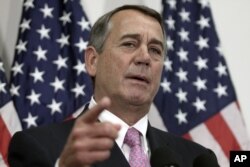Friday’s surprising move by U.S. Republican leadership to pull the bill known as the American Health Care Act was partly because of its rejection by a small group of conservative Republicans known as the Freedom Caucus.
The leader, Mark Meadows of North Carolina, said in a statement Friday that he had promised voters he would fight not only for a full repeal of the Affordable Care Act, also known as Obamacare, but also “a replacement with a market-driven approach that brings down costs and provides more choices for the American people.”
For the Freedom Caucus, the Republican health care bill was not conservative enough, even after the Trump administration gave in to demands to withdraw some essential health benefits.
The Republican bill could not pass without the support of the caucus, which has about 30 members.
Trump was reportedly irritated by the decision of the Freedom Caucus when he complained Friday about the lack of compliance by Republicans who refused to back the legislation.
Formed in 2015
The Freedom Caucus is 2 years old, having formed at a Republican congressional retreat in Hershey, Pennsylvania, in January 2015. The nine founders allowed others to join only if they confirmed they were willing to vote against the Speaker of the House — at the time, John Boehner — on issues that the group opposed.
The group soon flexed its collective muscle by helping to oust Boehner in September of that year. Boehner’s successor, Paul Ryan, had the support of a supermajority of Freedom Caucus members, which helped him get elected.
The Freedom Caucus is one of a number of lawmakers’ interest groups, known as caucuses, that meet and vote together on common legislative goals. Other Republican caucuses include the moderate Tuesday Group and the large, conservative Republican Study Committee.
Other caucuses
On the Democratic side, some conservative Democrats are members of the Blue Dog Caucus, while liberals are more likely to join the Congressional Progressive Caucus.
Bipartisan groups include the Congressional Black Caucus, for African-Americans, and the Climate Solutions Caucus, for work on climate change.











